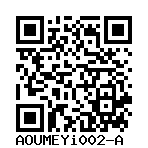The cell line is not validated yet.
AOUMEYi002-A
General
Cell Line |
|
| hPSCreg name | AOUMEYi002-A |
| Cite as: | AOUMEYi002-A (RRID:CVCL_D6IC) |
| Cell line type | Human induced pluripotent stem cell (hiPSC) |
| Similar lines | No similar lines found. |
| Last update | 20th November 2025 |
| User feedback | |
Provider |
|
| Generator | Meyer Children's Hospital IRCCS (AOUMEY) |
| Owner | Meyer Children's Hospital IRCCS (AOUMEY) |
| Distributors | |
| Derivation country | Italy |
External Databases |
|
| BioSamples | SAMEA115493381 |
| Cellosaurus | CVCL_D6IC |
| Wikidata | Q127380235 |
General Information |
|
| Publications | |
| * Is the cell line readily obtainable for third parties? |
Yes Cell line can only be used in: Lysosomal diseases
Research use: allowed
Clinical use: allowed
Commercial use: allowed
|
Donor Information
General Donor Information |
|
| Sex | female |
| Ethnicity | Caucasian |
Phenotype and Disease related information (Donor) |
|
| Diseases | A disease was diagnosed.
|
| Disease associated phenotypes |
|
| Is clinical information available? | yes |
Karyotyping (Donor) |
|
| Has the donor karyotype been analysed? |
Yes
46, XX
Karyotyping method:
Molecular karyotyping by SNP array
http:// |
Other Genotyping (Donor) |
|
| Is there genome-wide genotyping or functional data available? |
No
|
External Databases (Donor) |
|
| BioSamples | SAMEA115493382 |
Ethics
| Has informed consent been obtained from the donor of the embryo/tissue from which the pluripotent stem cells have been derived? | Yes |
| Was the consent voluntarily given? | Yes |
| Has the donor been informed that participation will not directly influence their personal treatment? | Yes |
| Can you provide us with a copy of the Donor Information Sheet provided to the donor? | Yes |
| Do you (Depositor/Provider) hold the original Donor Consent Form? | Yes |
| Please indicate whether the data associated with the donated material has been pseudonymised or anonymised. | pseudonymised |
| Does consent explicitly allow the derivation of pluripotent stem cells? | Yes |
| Does consent prevent CELLS DERIVED FROM THE DONATED BIOSAMPLE from being made available to researchers anywhere in the world? | No |
| How may genetic information associated with the cell line be accessed? | No information |
| Will the donor expect to receive financial benefit, beyond reasonable expenses, in return for donating the biosample? | No |
| Has a favourable opinion been obtained from a research ethics committee, or other ethics review panel, in relation to the Research Protocol including the consent provisions? | Yes |
| Name of accrediting authority involved? | Pediatric Ethics Committee of the Tuscany Region, Italy |
| Approval number | No 283/2021 |
| For generation of the cell line, who was the supplier of any recombined DNA vectors or commercial kits used? |
hIPSC Derivation
General |
|
| Source cell type |
Any skin fibroblast that is part of some dermis.
|
Reprogramming method |
|
| Vector type | Non-integrating |
| Vector | Non-integrating, self-replicating RNA vector |
| Is reprogramming vector detectable? |
No |
Vector free reprogramming |
|
| Type of used vector free reprogramming factor(s) |
Small molecules
|
Other |
|
| Derived under xeno-free conditions |
Unknown |
| Derived under GMP? |
Unknown |
| Available as clinical grade? |
Unknown |
Culture Conditions
| Medium |
mTeSR™ Plus
|
| Has Rock inhibitor (Y27632) been used at passage previously with this cell line? | No |
| Has Rock inhibitor (Y27632) been used at cryo previously with this cell line? | No |
| Has Rock inhibitor (Y27632) been used at thaw previously with this cell line? | No |
Characterisation
Analysis of Undifferentiated Cells
| Marker | Expressed | Immunostaining | RT-PCR | Flow Cytometry | Enzymatic Assay | Expression Profiles |
| NANOG |
Yes |
|
|
|||
| POU5F1 (OCT-4) |
Yes |
|
|
|||
| SOX2 |
Yes |
|
|
Differentiation Potency
Microbiology / Virus Screening |
|
| HIV 1 | Negative |
| HIV 2 | Negative |
| Hepatitis B | Negative |
| Hepatitis C | Negative |
| Mycoplasma | Negative |
Genotyping
Karyotyping (Cell Line) |
|
| Has the cell line karyotype been analysed? |
Yes
46, XX
Passage number: 10
Karyotyping method:
hiPSC Genetic Analysis Kit
|
Other Genotyping (Cell Line) |
|


Login to share your feedback, experiences or results with the research community.